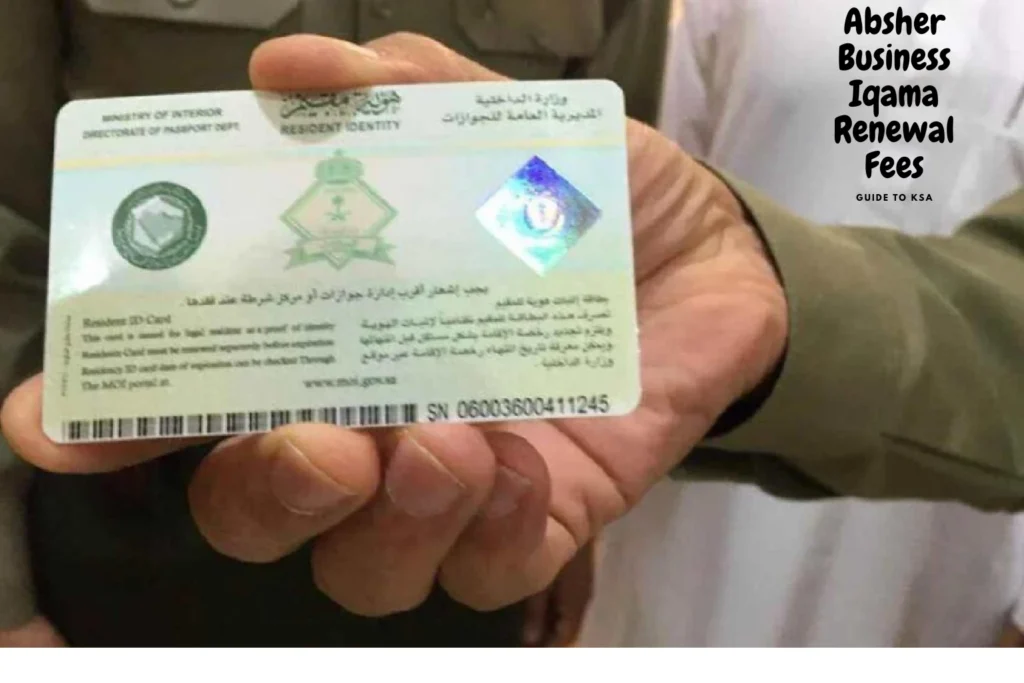In early January 2025, Saudi Arabia’s Ministry of Interior, through its digital hub Absher Business, introduced a absher business iqama renewal fees structure for several essential employer‑driven expat services.
These changes, effective immediately, impact exit‑reentry visas, Iqama (residency) renewals and issuances, final exit procedures, employee reports, and passport updates. While aimed at streamlining administrative costs, many expatriate workers and their sponsors are now scrutinizing how these adjustments will affect their financial obligations.
Breakdown of The Absher Business Iqama Renewal Fees
According to official statements and the Gulf News report, the updated charges are:
- Exit & re-entry visa extension: SR 103.50
- Iqama issuance: SR 51.75
- Iqama renewal: SR 51.75
- Final exit under Iqama: SR 70
- Employee‑report request (by employer): SR 28.75
- Updating passport information for expatriates: SR 69
These seven fees are exclusively applicable through the absher business iqama renewal fees e‑services portal, and not part of any annual employer subscription—highlighted emphatically by the Absher platform on its official X account (formerly Twitter)
What Is Absher Business?
Launched in 2017 by the Ministry of Interior, Absher Business offers a digital gateway for establishments to manage nationwide labor and immigration transactions. These include the issuance and renewal of worker visas, residency permits, final exit documents, and employee status reports. Operating alongside the individual-oriented Absher Individuals platform, it aims to expedite administrative workflows for employers across Saudi Arabia.
New Absher Individuals Feature: Reporting Absconding Visitors
At the same time, Absher Individuals rolled out a feature enabling sponsors to report visitor‑visa holders who abscond. It comes with stringent conditions to prevent misuse:
- Applicable only to personal or family visit visas
- Submission window begins 7 days after visa expiry
- Must be filed within 14 days post-expiry
- The visa must be officially expired at time of reporting
- Only one report per visitor, and submission is final
Once filed, these absconding reports are irreversible via the system, reinforcing accountability measures.
Why the Price Hike?
Though Saudi authorities have not officially detailed the rationale, analysts suggest several factors:
- Inflationary pressure in government services.
- The strategic aim to further digitalize and standardize administrative procedures.
- An effort to maintain cost recovery and transparency in e‑governance tools.
For employers and workers, these levies likely reflect a shift toward subsidizing online convenience, while making manual alternatives less attractive or possibly phased out.
Expatriate Impact: Who Should Pay Close Attention?
These changes affect two major categories:
- Employers/Establishments
- Responsible for executing these services via absher business iqama renewal fees.
- Likely must adjust budgets for renewals, exits, and visa extensions.
- Responsible for executing these services via absher business iqama renewal fees.
- Expatriate Employees
- Will see increased deductions or charges for Iqama updates, passport renewals, and exit visas.
- Those seeking re-entry or final settlement may face SR 70 charges at once.
- Will see increased deductions or charges for Iqama updates, passport renewals, and exit visas.
While the amounts—SR 51.75–103.50—might appear modest, they can accumulate, especially in households sending remittances or low-wage labor sectors.
Regional Response & Worker Sentiment
Though the revised fees have generated modest media coverage (New Age BD, Daily Sun), there’s little public dissent so far. Some employers view higher costs as a manageable outcome in exchange for the transparency and speed of digital processing. Meanwhile, labor advocates express concern that frequent renewals—especially tied to annual or biannual Iqama refreshes—could strain lower-income expatriate budgets.
It’s early days, but as more expats and establishments update their statuses, the cost‑benefit of digital vs manual channels may shape future public sentiment.
Action Checklist for Employers & Expatriates
To prepare for and mitigate any adverse effects, stakeholders should:
- Verify current Iqama & visa expiry dates to avoid rush penalties.
- Budget for cumulative charges—especially for households with multiple dependents.
- Consider group-processing to benefit from bulk timing and reduce administrative overhead.
- Stay informed through Absher communications and official outlets to catch updates or policy shifts.
Looking Ahead: What May Change in 2025–26
As Vision 2030’s digital transformation evolves, Saudi authorities may:
- Unify Absher fee structures across employer and individual platforms.
- Introduce subscription models that bundle multiple services at discounted rates.
- Expand digital reporting—possibly enabling smartphone-based biometric renewals or automated reminders.
These are speculative, but given the frequency of digital updates, further modernization is likely.
Final Thoughts
Saudi Arabia’s fee overhaul via Absher Business marks a pivotal moment in the nation’s digital migration strategy. While fees—from SR 28.75 to SR 103.50—aren’t exorbitant, they’re emblematic of broader trends: automation, transparency, and government cost recovery.
For expatriates and sponsoring businesses, awareness and proactive planning can help smooth the transition.


